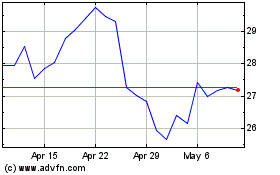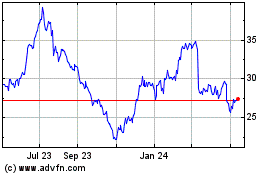United's Revenue Declines on Passenger Fare Weakness
October 17 2016 - 6:40PM
Dow Jones News
United Continental Holdings Inc., grappling like other U.S.
airlines with too much capacity, a strong U.S. dollar and
competitive pricing, said its third-quarter passenger revenue
declined $357 million from a year ago, helping to pull down total
revenue to $9.9 billion in its seasonally best quarter from $10.3
billion a year ago.
The third-largest U.S. airline by traffic said it saw some
improvement in its September unit revenue, the much-watched metric
of total passenger revenue for each seat flown a mile. Last-minute
business bookings were stronger than expected, due in part because
a calendar shift moved two Jewish holidays into October this year.
During those holidays business traffic usually declines.
United's quarterly unit revenue declined 5.8% from a year
earlier, within the range of its most recent guidance, which was
down 5.5% to 6%. Earlier, the company had expected a decline of
5.5% to 7.5%.
The Chicago-based company also said on Monday that it expects
its unit revenue to be down 4% to 6% in the current quarter, and
plans to trim trans-Atlantic capacity by up to 3.4% from the prior
year's period.
In the current quarter, United expects its capacity to be up 1%
to 2%, which would bring its full-year capacity up a modest 1.2% to
1.4%, the company said.
Delta Air Lines Inc., the No. 2 airline, last week said its unit
revenue should turn positive early next year, helped by further
trims to its capacity. In the third quarter, Delta's unit revenue
fell 6.8% from a year earlier, with nearly 2 percentage points of
impact from a technology outage in August that forced it to cancel
more than 2,000 flights.
United had a small technology issue last week when it was
loading flight schedule updates. But it was quickly fixed and only
led to 16 flight cancellations, the company said. United has
suffered from other outages in the past, but not nearly as severe
as Delta's recent experience or a similar one that hit Southwest
Airlines Co. in July.
United's third-quarter unit cost, excluding fuel and
profit-sharing, rose 3.4%, including 2 percentage points of impact
from new, costlier labor contracts with pilots, flight attendants,
ramp workers and customer-service agents. United's mechanics are
expected to vote soon on a new contract. United said it expects its
fourth-quarter unit cost, excluding fuel and other items, to be up
4.75% to 5.75% from a year ago.
Andrew Levy, the chief financial officer, said United expects
next year "to see a step up in our labor costs" as the company
strives to motivate its employees and help it close its margin gap
with its peers. He said 4 percentage points of the expected
fourth-quarter increase will be due to the new contracts, not
including a tentative deal with the mechanics.
Chicago-based United earned $965 million in the September
quarter, or $3.01 a share. Excluding items, its earnings of $997
million, or $3.11 a share, beat Wall Street estimates. Revenue was
in line with forecasts.
A year ago, the company earned $4.8 billion, but that figure was
boosted by a one-time $3.2 billion noncash income-tax benefit. The
company began booking taxes on its earnings this year, which caused
net income to decline compared with earlier periods when it didn't
book taxes. But it pays minimal to no cash taxes while it works off
its billions of dollars of net operating loss carryforwards, tax
credits accrued during earlier years of heavy losses.
In Monday trading, United shares closed down 0.3% at $53.03.
Write to Susan Carey at susan.carey@wsj.com
(END) Dow Jones Newswires
October 17, 2016 18:25 ET (22:25 GMT)
Copyright (c) 2016 Dow Jones & Company, Inc.
Southwest Airlines (NYSE:LUV)
Historical Stock Chart
From Mar 2024 to Apr 2024

Southwest Airlines (NYSE:LUV)
Historical Stock Chart
From Apr 2023 to Apr 2024
